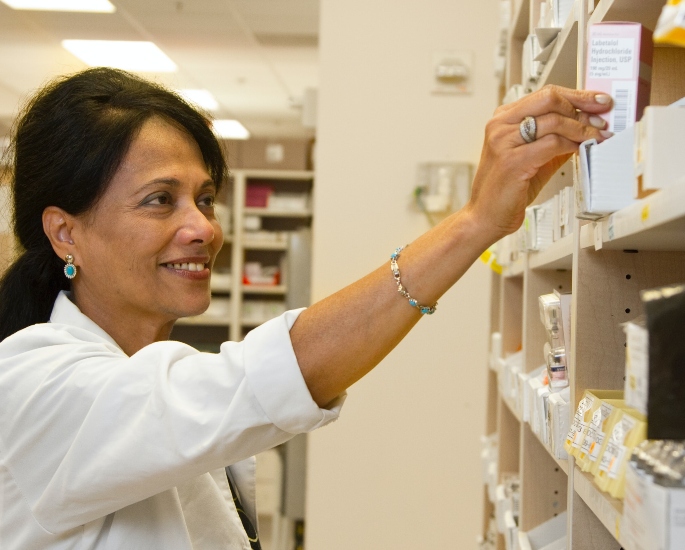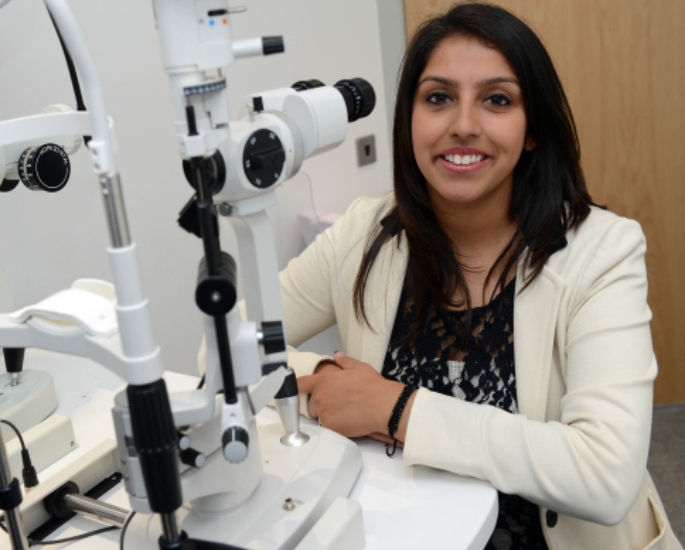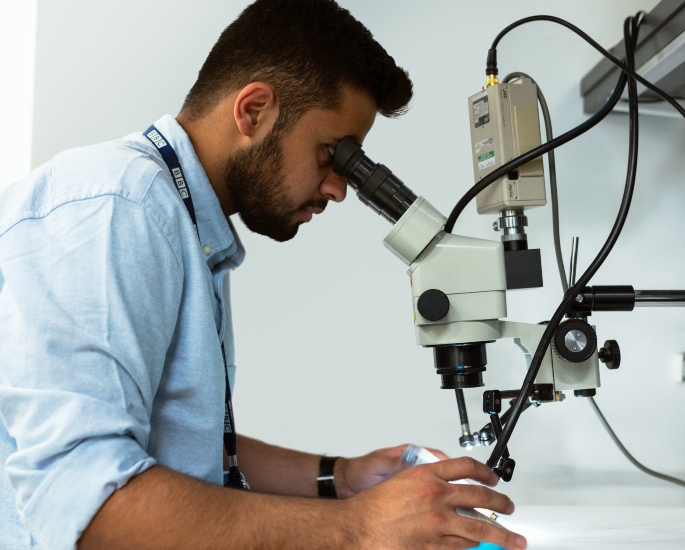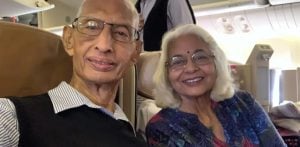"I knew I needed a job, which had a lot of room for growth"
Choosing the best job is a daunting decision for many British Asians, with many going for stereotypically ‘safe careers’.
Although more South Asians are expanding their careers and starting to infiltrate artistic industries, many still opt for healthcare, science, and law-based roles.
Numerous South Asian professionals reside in these sectors for a variety of reasons.
Firstly, roles such as doctors and lawyers are always in demand. Secondly, these enterprises offer lucrative salaries – a fundamental aspect for many British Asians and their families.
In addition, many British Asians are also drawn towards jobs in engineering and IT. Not only are these sectors popular, but they also demand respect.
This is particularly the case when factoring in how advantageous these ‘safe careers’ are during marriage discussions.
Even though roles like a solicitor or pharmacist are deemed ‘typical’, they still require years of hard work and dedication to obtain.
Interestingly, some British Asians pursue these types of roles only to end up working in another industry. Family stresses, peer pressure, and social experiences can all contribute to this.
With this, DESIblitz explores 10 ‘safe careers’ chosen by British Asians, which could help shape your professional journey.
Doctor

One of the most ‘safe careers’ for British Asians is becoming a doctor. This role requires a substantial amount of application as it can take a minimum of six years to become qualified.
Seen as the most rewarding of careers, many British Asian families tend to guide their sons and daughters into this profession from an early age.
The salary is fruitful, with doctors earning between £60,000-£100,000. However, this depends on the length of service and if you are a speciality doctor such as a dermatologist.
The popularity of this field is evident with British Asians. As of January 2021, 31.4% of senior doctors and 42.9% of speciality doctors in the UK are from a South Asian background.
This ties into the countless comments at weddings, parties, and functions. Aunties asking “what are you going to study?” is abruptly answered by parents or the elders with “they’re going to be a doctor.”
Becoming a doctor is undoubtedly a rewarding career.
Helping others, improving one’s health, and providing a safe space for patients is worthwhile.
In addition, it serves as a progressive role that brings status and impact. In 2019, Dr Nikita Kanani was ranked as the second most influential GP in the UK.
She was also the first woman to be the director of primary care for the NHS in 2018.
These impressive accolades serve as motivation for those who wish to pursue this role but also prove how impactful British Asians are within this field.
Pharmacist

Becoming a pharmacist is also a prominent career choice for British Asians. For those who may not want the responsibility of a doctor but similar perks, pharmacy is a favoured industry.
As a stable and well-regarded career, pharmacists can earn a salary between £25,000-£50,000, again depending on experience and education.
Job security is one of the main aspects of a career for British Asians that is drilled into them by their family.
Moving from job to job or having long periods of unemployment is frowned upon within UK’s South Asian community.
Traditionally, some families assume that this is a direct correlation with poor education or a lazy attitude.
In such cases, qualities won’t be accepted when the bibis (grandmother) try to figure out your suitability for their family.
This ideology, although common is unfair and explains why many British Asians feel extremely stressed in classrooms and when taking exams.
The innate pressure to do well in school, achieve the best grades and secure a substantial career is overwhelming.
Although these burdens drive British Asians to secure a solid education and career, is their happiness being sacrificed?
Lawyer

One of the most sought-after careers within the British Asian community lies in law.
Ranging from junior solicitor to senior partner, becoming a lawyer is one of the most credible yet taxing roles you can acquire.
Going through a three-year degree, followed by assessments and two years of legal work experience, becoming a qualified lawyer can take between five and six years.
Interestingly, with many occupations on this list, many of them require more than just an undergraduate degree, which is seen as a standard.
Further experience and extracurricular work highlight to many families that you are committed and well-educated – both desirable traits.
In addition, this also gives parents ‘bragging rights’ within their community. If their child is successful, it reflects on them, which brings more respect from family and friends.
Although, this begs the question; can’t these same outlooks and beliefs be achieved through more ‘daring’ and artistic careers?
Journalists, musicians and painters are all worthwhile careers but are less-respected. This is partly due to very few role models within the community who have gone against the grain.
If British Asians continue to be influenced by outdated traditions, then the number of Desis within these ‘safer’ fields will increase.
Surgeon

One of the most respected careers within the British Asian community is becoming a surgeon.
This type of role can elevate someone amongst family and friends due to the amount of risk within a surgeon’s job.
Not only do they take on some of the responsibilities of a doctor, but they play an active and practical role within their treatment. A literal life or death career.
Additionally, there are numerous speciality surgeon roles like orthopaedic and pediatric. This allows candidates to expand their skillset and internally evolve within the role.
Also, with notable salaries ranging between £27,000-£100,000, it remains quite obvious why British Asians decide to pursue this role.
However, with extraneous hours, intricate operations, and a duty of care, surgeons are under immense pressure around the clock.
Surprisingly, some South Asian families see this amount of work as more appealing.
The long hours and extraneous physical toll are somehow representative of a better career choice.
This of course is not the case. Many careers, including more ‘basic’ roles such as retail, still have the capability of being hectic and tedious.
However, some British Asians grow up hearing their family members snarl at certain occupations or career paths.
This unconsciously persuades them to pursue a career that will be accepted by others, instead of one that makes them content. A cycle that needs modernising.
Optician

In the 2018 Institute for Employment Studies Optometrists’ Futures report, it was found that those from South Asian backgrounds represented 28% of all optometrists in the UK.
However, it also found that there were more South Asian student optometrists (45%) than white student optometrists (43%).
This indicates that more British Asians are starting to choose optometry at university and breaking through into the profession.
Whilst this is still a fairly fresh career choice amongst Desis, it still offers the ‘safe’ perks, which British Asians are attracted to.
Money, progression, stability and status are all on offer within this role.
Kiran, a student optometrist from Birmingham revealed why she chose this specific path:
“I knew I needed a job, which had a lot of room for growth but more importantly, a good salary.”
Kiran continues to add about how she opted for a career, which was more comfortable to her liking but accepted by all:
“My parents would always talk about my cousins who were getting good money in law or medicine but I had no interest.
“So, I chose something which made them and myself happy.”
This shows that parents do have a significant impact on South Asian children and the career choices they make.
Many Desis tend to choose a role that will make their parents happy, often disregarding their own interests.
Accountant

Numerous British Asians are exposed to strict rules, surrounding schoolwork and the subjects they choose for GCSE’s and A-Levels.
This is because these subjects dictate the type of industry that the individual will be able to explore in the future.
Science and maths based jobs are especially popular, with accountancy being a top option for those that wish to utilise their numbers knowledge.
With impressive salaries ranging in between £17,000-£74,000, it is no wonder why British Asians are drawn to such a lucrative career.
Arun, a senior accountant from Manchester told DESIblitz why he got into this profession:
“I was interested in maths at school but didn’t think it would get me anywhere. After looking around at the type of degree I wanted and how much I wanted to earn, I saw accountancy.
“I hated it at first but the perks of the job began to roll through.”
“There are a lot of numbers, reports and fine margins but once you find the right balance, it’s not so bad.”
Interestingly, even with many British Asians choosing ‘safe careers’, many remain in such professions for their whole lives.
Even with parental influences and family pressures that Desis have to deal with, perseverance is a trait, which many show within these roles.
Furthermore, people like Arun who choose accountancy know the burdens of the job can actually help you in the long run.
Persisting with the workload and gathering a vast amount of experience can catapult you amongst companies that can open up the door to senior roles and senior salaries.
With such a high demand for accountants, there’s no wonder why British Asians pursue this type of job.
IT

South Asians are stereotypically associated with roles within IT such as computer technician or web developer because of the knowledge that is required for these jobs.
Although many British Asians choose ICT in school and they learn the basics of computing, some don’t envision themselves as having an IT-based career.
However, within this age of technology, these types of jobs are seeing more British Asian representatives.
Many British Asians growing up had to help their parents and grandparents with modern devices.
So unconsciously, Desis already picked up the insight and qualities you need to survive in the IT industry.
Not only does the job pay well with salaries ranging in between £25,000-£75,000, but it also allows for a better social life outside of work.
Even though medical and law roles are superb, they do require a lot of time and dedication, which means life outside of work is sometimes sacrificed.
Anil, an IT support engineer from Luton reiterated this point:
“As an Indian, I thought I was going to be a lawyer or doctor because all my cousins were.”
He continues to state that he was lucky to get some key advice, along with his folks also seeing the benefits:
“Luckily I got told by my friend that jobs in IT pay just as well and there isn’t that much-added pressure.
“My parents weren’t pleased at first but once they saw me working hard but also having the time for them, they came around.”
Moreover, as British Asians grow up in multilingual homes speaking Punjabi, Urdu, Hindi and other South Asian languages, it makes them well-equipped for these types of jobs.
Companies thrive off this and it allows more British Asians to triumph in these positions.
Engineer

Engineering is also a considerable industry that British Asians choose to go into because it unifies science, maths and technology.
It is believed to thrive in these roles, subjects like physics and maths are essential.
As most British Asian students choose the sciences as part of their A-Levels, it comes as no surprise to see them within engineering.
Chemical engineering sees a big influx of British Asians as the main duties of the role surround altering substances.
This means that those with a chemical engineering degree can enter industries like oil, gas and pharmaceuticals.
All of these industries are very appealing to Desis and their families.
With such endless possibilities and an attractive average salary of £54,000, British Asians choosing this ‘safe career’ is normality.
Central to the cultural values and ethics within a Desi household, it is imperative that the children succeed in a high-ranking industry.
Not only does the role provide endless perks such as flexibility and normal working hours, but it also impresses the parents and family.
Teacher

Although teaching does not see as many British Asians as other industries, it is slowly becoming a go-to option for many individuals.
As teachers are in very high demand across the UK and the world, British Asians see it as a ‘safe career’ choice because it is easier to achieve.
It allows many Desis to be flexible with the subjects and degrees they choose and does not tie them down to a specific avenue.
Zara, a trainee teacher from Birmingham emphasises this, saying:
“I didn’t know I wanted to be a teacher until after I graduated. In school, I wasn’t into science or maths which already annoyed my family.
“I loved English and decided to stick with that. It made school and university bearable because I didn’t feel forced into learning about something just for the potential salary I could get.
“Then I knew teaching could utilise my love for English and I could have a job that was rewarding as well as enjoyable.”
Another great aspect that entices British Asians is the steady income they receive from teaching. This financial security is crucial for Desis and their family.
Parents can often pressurise their children to have an impeccable education because it is the route to the most money.
Having said that, families are becoming more concerned with a continuous income, not the amount of it.
This means that teaching is becoming one of the ‘safest’ careers chosen by British Asians as it still offers a great salary, job security and progression.
Dentist

Dentistry is one of the top professions chosen by British Asians due to its similarity with other medical careers.
Taking a minimum of seven years to become a qualified dentist, it is a progressive industry that offers stability and financial security.
With salaries ranging from anywhere between £32,000-£110,000, dentistry is a lucrative industry that impresses many South Asians and their families.
Private dentists can even earn over £140,000, a figure, which lures in more British Asian candidates each year.
Again, like many of these ‘safe careers’, dentists are always sought after by both public and private organisations.
Mohammed, a dentist from Birmingham reveals opting for an alternative part to an obvious medical career:
“My parents wanted me to become a doctor and although I was going to, I ended up doing dentistry to be different.
“After doing my education, I ended up working for a private company which meant a better salary.
“I told my family and they couldn’t believe it.”
“They always used to talk about my cousins who excelled as doctors but now they talk about me like that so I hope it actually inspires some family members.”
Mohammed reiterated how family pressures can actually do more harm than good.
Although parents just want their children to be successful, they also need to let them develop and decide what is best for them.
Will things change?
Even though it is incredible to see more British Asians enter artistic industries, these ‘safe careers’ are continually being chosen.
These professions are superb and offer a plethora of advantages. However, there still needs to be a shift in ideologies that allows British Asians to feel less pressure.
Cultural values like dedication and work ethics are undoubtedly part of every Desi household. However, more creative qualities should still be celebrated.
Having a good career with a stable salary is important, but, British Asians should still feel open enough to explore areas they are passionate about.
Ultimately it is one’s own choice. There is no right or wrong in such a decision. The most important factor is being happy and content within your chosen career.






























































